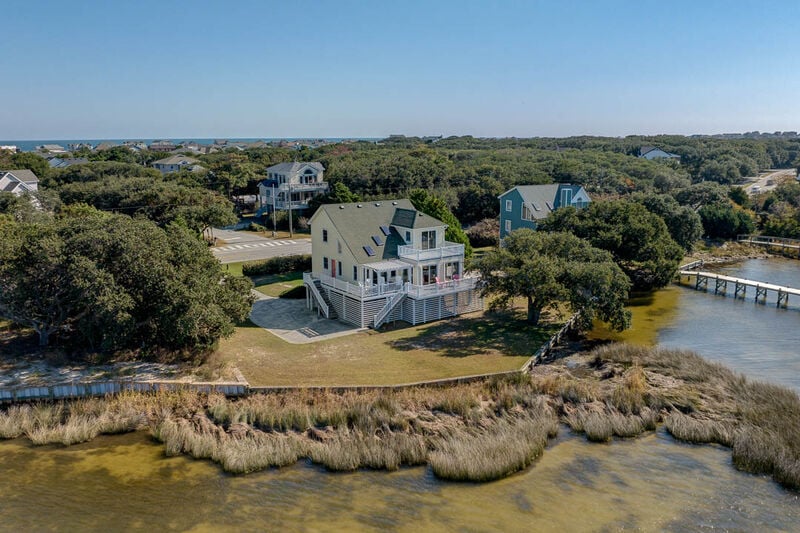The Outer Banks boasts some of the most beautiful coastal scenery in North Carolina. It attracts thousands of visitors each year, and many of those visitors are ducks and other waterfowl. Thanks to the beautiful waters and bays along the shoreline, hunters find a multitude of ducks, geese and other waterfowl at the Outer Banks during the winter months.
In addition to these well-loved hunting spots, there are also miles of coastline that are visited less often, but still offer an exceptional hunting experience with breathtaking scenery and plenty of waterfowl.
If you are planning a hunting trip this winter, be sure to add the Outer Banks to your itinerary. The beautiful scenery, majestic waterways and quiet solitude make this region an ideal place for getting away from it all and enjoying the challenge of bagging your daily limit of ducks and geese.
When Is Duck Hunting Season?
Duck hunting season in the Outer Banks is open from October through early March, depending on the type of duck you plan to hunt. Before you plan your trip, visit the North Carolina Wildlife website for specific information about the various duck seasons. Be sure to apply for specific permits as needed. Hunting hours begin a half-hour before sunrise and end at sunset. Seasons for specific waterfowl are as follows:- Ducks, Mergansers and Coots: October 2-5, November 9 - November 30, and December 14 - January 25
- Sea Ducks (In special sea duck area only): October 2 - January 31
- Dark Geese (Includes Canada geese and white-fronted geese):
- Resident population hunt zone: October 2-12, November 9-30, Dec. 14 - Feb. 8
- Southern James Bay hunt zone: Oct. 2-30, Nov. 9-Dec. 31
- Northeast hunt zone: January 10-25 (By permit only)
- Light Geese (Includes snow geese, blue geese, and Ross' geese): October 16-19, November 9 - March 8
- Brant: December 23 - January 25
- Tundra Swan: November 9 - January 31
- Youth Waterfowl Days (Includes ducks, geese, brant, mergansers, coots and tundra swans with appropriate permits): February 1 and February 8
What Types Of Duck Hunting Are Available?
Duck guides usually offer a variety of hunting experiences in order to provide some variety and the best chance of helping hunters reach their bag limit. Some of the options offered include:- Open Water — Open water duck hunting depends on a large spread of decoys and a reliable duck call. Because you will be hunting from a boat, you do not necessarily need to wear waders, although it is a good idea to keep a pair with you just in case.
- Blinds — If you hire a guide, he will most likely have established blinds to choose from. Variety is helpful in reaching your bag limit early in the day, so take advantage of the various types of blinds that your guide suggests.
- Shore — Field blinds can be a good option if you prefer to do your hunting from the shore. Layout blinds that blend into the landscape and can be easily moved provide excellent cover for hunting ducks on dry land.
What Are The Best Places To Hunt?
The Outer Banks offer many miles of prime shoreline with excellent duck hunting possibilities. There are several favored spots for duck blinds up and down the coast, including:- Currituck National Wildlife Refuge — You will need a shallow-draft boat to access the waterfowl in this area, but the excellent hunting is well worth the trip.
- Cape Hatteras National Seashore — There is an excellent section of the coastline along Cape Hatteras where ducks can almost always be found. It is important to remain within legal hunting grounds, however, because the nearby Pea Island National Wildlife Refuge is closed to hunters.
- Northern Outer Banks — One of the areas that made the Outer Banks famous among duck hunters, this region is popular with local hunters and guides.
In addition to these well-loved hunting spots, there are also miles of coastline that are visited less often, but still offer an exceptional hunting experience with breathtaking scenery and plenty of waterfowl.
Should You Hire A Guide?
Because there are several wildlife refuges along the coast that are off-limits to hunters, it can be helpful to hire a guide who knows the area well. Guides will also have established blinds that consistently yield good results, and most will give you as much or as little help as you want during the hunt.What Should You Bring?
Dress in neutral colors (brown camouflage is best). Wear warm clothing, but don't overdress. Because you will be doing a lot of walking, you may get overheated if you wear too many layers. Bring waders and a waterproof jacket in case of rain. If you plan to hunt all day, be sure to bring snacks and drinks. Finally, remember a cooler for all the ducks you will be bringing home!What Are The Bag Limits?
Bag limits vary depending on the type of duck, with possession limits set at three times that amount. For conventional bag limit information as well as bag limits on specific types of waterfowl, visit the North Carolina Wildlife page.If you are planning a hunting trip this winter, be sure to add the Outer Banks to your itinerary. The beautiful scenery, majestic waterways and quiet solitude make this region an ideal place for getting away from it all and enjoying the challenge of bagging your daily limit of ducks and geese.









